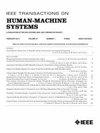Trust in Range Estimation System in Battery Electric Vehicles–A Mixed Approach
IF 3.5
3区 计算机科学
Q2 COMPUTER SCIENCE, ARTIFICIAL INTELLIGENCE
引用次数: 0
Abstract
The electrification of vehicle power systems has become a dominant trend worldwide. However, with current technologies, range anxiety is still a major obstacle to the popularization of battery electric vehicles (BEVs). Previous research has found that users’ trust in the BEVs’ range estimation system (RES) is associated with their range anxiety. However, influential factors of trust in RES have not yet been explored. Thus, a questionnaire was designed to model the factors that are directly (i.e., implicit factors) and indirectly (i.e., explicit factors) associated with BEV users’ trust in RES. Following the three-layer automation trust framework (i.e., dispositional trust, situational trust, and learned trust), a questionnaire was designed and administrated online. In total, 367 valid samples were collected from BEV users in mainland China. A mixed approach combining Bayesian network (BN) and regression analyses (i.e., BN–regression mixed approach) was proposed to explore the potential topological relationships among factors. Four implicit factors (i.e., sensitivity to BEV brand, knowledge of RES, users’ emotional stability, and trust in the battery estimation system of their phones) have been found to be directly associated with BEV users’ trust in RES. Furthermore, four explicit factors (i.e., users’ highest education, regional charging infrastructure development, BEV brand, and household income) were found to be indirectly associated with users’ trust in RES. This study further demonstrates the effectiveness of using a BN–regression mixed approach to explore topological relationships among social–psychological factors. Future strategies aiming to modulate trust in RES can target toward factors in different levels of the topological structure.电池电动汽车里程估计系统中的信任--混合方法
汽车动力系统电气化已成为全球的主流趋势。然而,在现有技术条件下,续航里程焦虑仍然是电池电动汽车(BEV)普及的主要障碍。以往的研究发现,用户对 BEV 的续航里程估计系统(RES)的信任与他们的续航里程焦虑有关。然而,尚未探究信任度的影响因素。因此,我们设计了一份调查问卷,以模拟与 BEV 用户对 RES 信任直接相关的因素(即隐性因素)和间接相关的因素(即显性因素)。按照三层自动化信任框架(即处置信任、情景信任和学习信任),设计了一份问卷并进行了在线发放。共收集了 367 份来自中国大陆 BEV 用户的有效样本。研究采用贝叶斯网络(BN)和回归分析相结合的混合方法(即 BN- 回归混合方法)来探索各因素之间的潜在拓扑关系。研究发现,四个隐性因素(即对 BEV 品牌的敏感性、对 RES 的了解、用户的情绪稳定性和对手机电池估算系统的信任)与 BEV 用户对 RES 的信任直接相关。此外,研究还发现四个显性因素(即用户的最高学历、地区充电基础设施发展情况、BEV 品牌和家庭收入)与用户对可再生能源的信任间接相关。本研究进一步证明了使用BN-回归混合方法探索社会心理因素之间拓扑关系的有效性。未来旨在调节用户对 RES 信任度的策略可以针对拓扑结构中不同层次的因素。
本文章由计算机程序翻译,如有差异,请以英文原文为准。
求助全文
约1分钟内获得全文
求助全文
来源期刊

IEEE Transactions on Human-Machine Systems
COMPUTER SCIENCE, ARTIFICIAL INTELLIGENCE-COMPUTER SCIENCE, CYBERNETICS
CiteScore
7.10
自引率
11.10%
发文量
136
期刊介绍:
The scope of the IEEE Transactions on Human-Machine Systems includes the fields of human machine systems. It covers human systems and human organizational interactions including cognitive ergonomics, system test and evaluation, and human information processing concerns in systems and organizations.
 求助内容:
求助内容: 应助结果提醒方式:
应助结果提醒方式:


